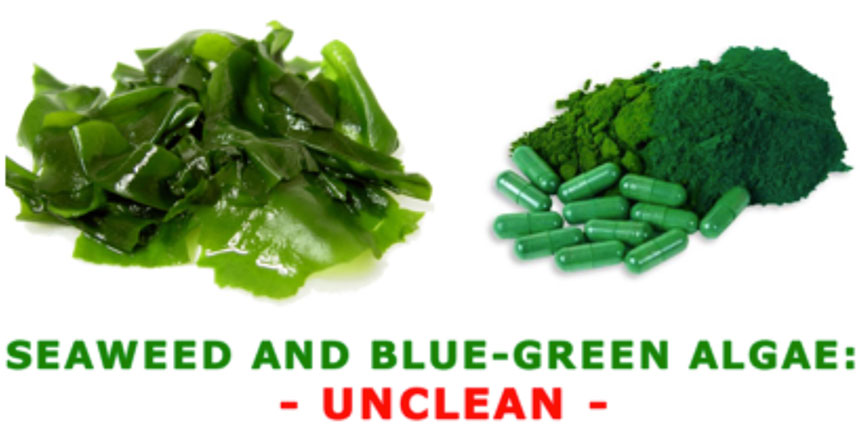| *Download article in PDF Format |
|---|
Many Jewish rabbinical authorities have determined that refined seaweed and blue-green algae are clean kosher products. This article will challenge that determination, arguing the case against seaweed and blue-green algae being classified as clean and kosher, and will declare them UNCLEAN.
Various seaweed and blue-green algae products are certified, marketed, and sold as kosher. Sea plants can be categorized into two general types: those having roots that are attached to the ocean bottom and those not having roots that simply drift about with the water. Sea plants or organisms, drifting or rooted, are unclean. Commonly eaten drifting sea plants and organisms are seaweed and blue-green algae.
Many Jewish rabbinical authorities have classified seaweed, blue-green algae, and other sea plants (kelp) as clean and kosher, based on the misnomer that these sea plants or organisms are vegetation.
GENESIS 1:29 (NKJV):
Every herb that yields SEED which is on the face of all the earth, and every tree whose fruit yields SEED; to you it shall be for food.
LEVITICUS 11:9-12; DEUTERONOMY 14:9-10 (NKJV):
These you may eat of all that are in the waters: you may eat all that have FINS AND SCALES. And WHATEVER does not have FINS AND SCALES you shall not eat; it is unclean for you.
Sea plants, sometimes referred to as sea ‘vegetation,’ do not yield seed and are therefore unclean (Genesis 1:29). To call algae, kelp, nori, spirulina (spiralina), carrageenan, or any ‘sea-weed’ a ‘vegetable’ is biologically incorrect or simple ignorance of marine life.
Despite their plant-like appearance, scientists do not group algae with terrestrial plants, but instead group them in differing microscopic classifications of the animal kingdom. Algae lack true roots, stems, seeds, leaves, and flowers. Algae differ from flowering plants in that they have a holdfast instead of roots, a stipe instead of a stem, and a blade or thallus instead of leaves. Without roots or internal tissues to conduct water, algae absorb minerals and gases directly from seawater through the surface of their blades. Algae (all seaweeds) are nature’s water filters.
SEAWEED
Seaweeds are saltwater-dwelling marine algae. Seaweed is a name applied to almost any plantlike marine organism that is large enough to be seen with the unaided eye. Seaweeds can be found growing in underwater beds, floating on the sea surface, attached to rocks and piers, and washed up on shore.
ORIENTAL CUISINE
Seaweed is commonly used in Chinese, Japanese, and Korean salads, soups, and other dishes. Nori seaweed is used to wrap raw fish and rice for sushi. For dietary law-minded believers who eat sushi, the fish consumed should be a clean fish, such as salmon, and it should be ordered à la carte or sashimi, without a seaweed roll or wrap.
BLUE-GREEN ALGAE
Blue-green algae, commonly known as pond scum, are microscopic plant-like organisms that form in warm, shallow, slow moving, or still water including ponds and lakes. Blue-green algae are scientifically known as cyanobacteria.
SNAKE OIL
Beware of snake oil salesmen who promise you health in a bottle. They peddle blue-green algae, shark liver oil, and other such ‘miracle’ products as remedies or preventive medicine foods. Phony dietary ‘health’ supplements, medicines, and tonics proclaiming to treat or cure various ailments have always been promoted and sold to a scripturally uninformed and gullible public. Miraculous claims associated with any such dietary supplement product should be thoroughly researched by the consumer. Often these phony medicines contain creatures that are scripturally unclean for human consumption, thereby offsetting any dubious medicinal benefits. Blue-green algae has been promoted to treat or cure a host of ailments, including asthma, allergies, anxiety, depression, fatigue, hypoglycemia, digestive problems, and attention deficit disorder, and even help with weight loss, improve memory and mental ability, ‘detoxify’ the body, and boost the immune system.
Blue-green algae can be easily contaminated with toxic substances, notably microcystins and heavy metals. The presence of blue-green algae toxins in surface waters used for drinking water and recreation is a public health concern. Algae blooms can be toxic to humans and sometimes kill dogs that lap up the slime. Of the more than 1500 known species, some have been reported to cause feelings of general malaise, gastroenteritis, gastrointestinal discomfort, hepatitis, and jaundice [1].
Some blue-green algae advocates have proposed a spiritually disturbing sales pitch that humanity evolved from the sea and we all once ate blue-green algae as part of our natural diet in our primordial past. If a person believes that we were once algae-consuming fish that evolved eons ago to become oxygen-breathing humans, then perhaps blue-green algae may be a product for him or her! As for Messianics, Christians, and others who believe that God created man, and has instructed man what to eat for food via His Dietary Commandments, then blue-green algae is something to be avoided as unclean. Blue-green algae are basically pond scum peddled as a health supplement bottled in the form of capsules, pills, and powders.
Persons who have consumed blue-green algae supplements to detoxify their body have often experienced the pain and discomfort of adding toxins to it.
Seaweed and blue-green algae do not produce seed, nor do they have fins and scales, which renders them unclean (Genesis 1:29; Leviticus 11:9-12; Deuteronomy 14:9-10).
1. “Blue-green algae products testing – only Spirulina found Microcystin-free,” Health Canada news release, Sept 17, 1999.



